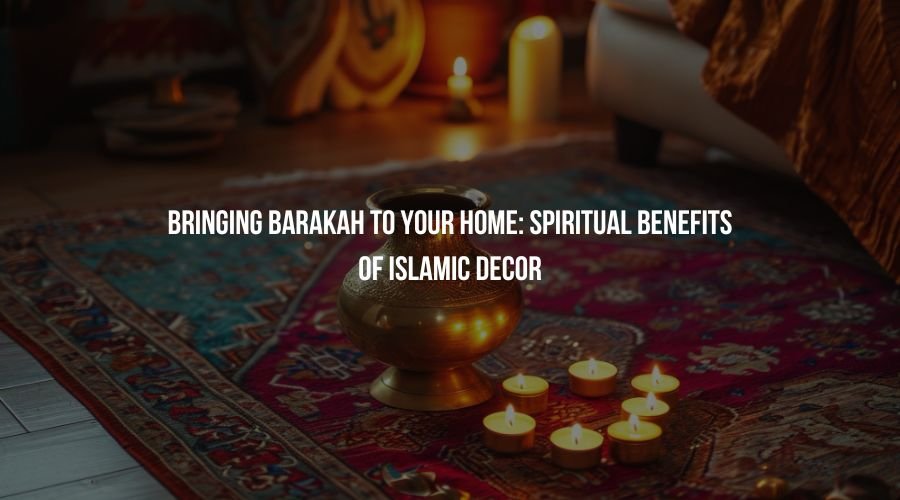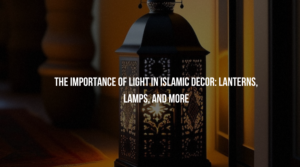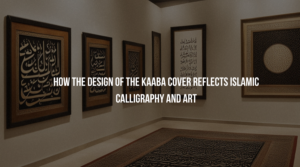In Islam, the home is not just a physical space; it is a sanctuary, a place of peace, reflection, and worship. Adorning your home with Islamic decor is more than just an aesthetic choice—it’s a means of bringing barakah, or blessings, into your living space. By incorporating elements like the Kaaba Kiswa, Islamic art, and other forms of Islamic wall art, you can create an environment that nurtures the soul and enhances spiritual well-being.
Understanding Barakah
The notion of barakah, which translates to “blessing” or “divine abundance,” encompasses all facets of a Muslim’s existence. It is the spiritual presence and significance that Allah bestows upon an act, person, or thing. When a home is filled with barakah, it becomes a place where inhabitants feel peace, joy, and spiritual fulfillment.
The Spiritual Significance of Islamic Decor
Islamic decor plays a crucial role in cultivating an atmosphere that invites barakah. The use of religious symbols, calligraphy, and meaningful artworks can transform a regular living space into a sanctuary of faith. Here are some ways Islamic decor contributes to the spiritual ambiance of a Muslim home:
1. Reminders of Faith
Islamic decor often features Quranic verses, the names of Allah, and prophetic traditions. These visual reminders help keep faith at the forefront of daily life, encouraging continuous reflection and mindfulness of Allah’s presence.
2. Aesthetic Reflection of Spirituality
The beauty of Islamic art, characterized by intricate geometric patterns, arabesques, and calligraphy, reflects the infinite and harmonious nature of Allah’s creation. This aesthetic harmony can help foster inner peace and contemplation.
3. Connection to Islamic Heritage
Incorporating elements such as the Kaaba Kiswa or Islamic wall art connects the home to the rich heritage and history of Islam, fostering a sense of belonging and identity.
The Role of the Kaaba Cover in Muslim Home Decor
The Kaaba Kiswa, or Kaaba Cover, holds profound spiritual significance in Islam. The Kaaba Cover is the cloth that covers the Kaaba in Mecca, the holiest site in Islam. Adorning your home with replicas or images of the Kiswa can bring a sense of sacredness and reverence.
1. Symbol of Unity and Worship
The Kaaba is known as the qibla, it is the direction that Muslims face during their prayer. A representation of the Kaaba Kiswa in your home can serve as a constant reminder of this unity and centrality of worship in a Muslim’s life.
2. Enhancing Spiritual Focus
Placing Islamic decor items such as the Kiswa in prominent areas of your home can help create a dedicated space for prayer and reflection, enhancing your spiritual focus and devotion.
Incorporating Islamic Art and Wall Art
Islamic wall art is beautiful with deep meaning. Here’s how you can incorporate it into your home decor to bring barakah:
1. Calligraphy
Calligraphy is the most popular form of Islamic art. Verses from the Quran, names of Allah, and Hadiths are commonly used in calligraphic art. Placing these pieces around your home can provide constant spiritual reminders and inspire reflection and prayer.
2. Geometric Patterns
Islamic art is known for its intricate geometric patterns, which symbolize the infinite nature of Allah. These patterns can be found in various forms, from wallpapers to carpets and wall art.
3. Arabesque Designs
These are artistic motif designs featuring interlacing foliage and floral patterns. They represent the underlying unity and continuity in nature and can add an element of serene beauty to your home.
Practical Tips for Islamic Home Decor
To effectively incorporate Islamic decor and maximize the spiritual benefits, consider the following tips:
1. Start with Intent
The intention behind decorating your home with Islamic elements should be to enhance your spiritual environment and bring barakah. This sincere intention itself attracts blessings.
2. Choose Meaningful Pieces
Select decor items that resonate with you spiritually. Whether it’s a piece of Islamic wall art featuring a Quranic verse that is particularly meaningful to you or a Kaaba Kiswa replica, choose items that inspire and uplift you.
3. Balance and Harmony
Strive for balance and harmony in your decor. A few well-chosen pieces can have a more profound spiritual impact than an overcrowded room.
4. Regularly Update and Refresh
Just as you would with your personal spiritual practice, keep your home decor fresh and updated. This could mean rotating different pieces of Islamic art or introducing new elements to maintain a vibrant and inspiring environment.
Examples of Islamic Decor Elements
Here are some specific items you can consider incorporating into your home decor:
1. Framed Calligraphy
Whether it’s a favorite Quranic verse or the name of Allah, framed calligraphy pieces can be hung in living rooms, bedrooms, or prayer areas.
2. Kiswa Replicas
These can be used as wall hangings or even as prayer mats, providing a constant visual reminder of the Kaaba and the significance of Mecca.
3. Islamic Wall Art
This can include geometric patterns, arabesque designs, and other forms of Islamic art that are both aesthetically pleasing and spiritually enriching.
4. Decorative Objects
Items such as Islamic-themed vases, lanterns, and cushions can subtly incorporate Islamic motifs into your everyday living space.
Conclusion
Incorporating Islamic decor into your home is a beautiful way to bring barakah and enhance the spiritual atmosphere of your living space. By thoughtfully choosing items like the Kaaba Kiswa, Islamic art, and wall art, you can create an environment that not only looks aesthetically pleasing but also nurtures your faith and spirituality. Remember, the key is to approach this with sincere intention and a desire to draw closer to Allah. As you surround yourself with these reminders of faith, may your home be filled with peace, blessings, and divine abundance.




